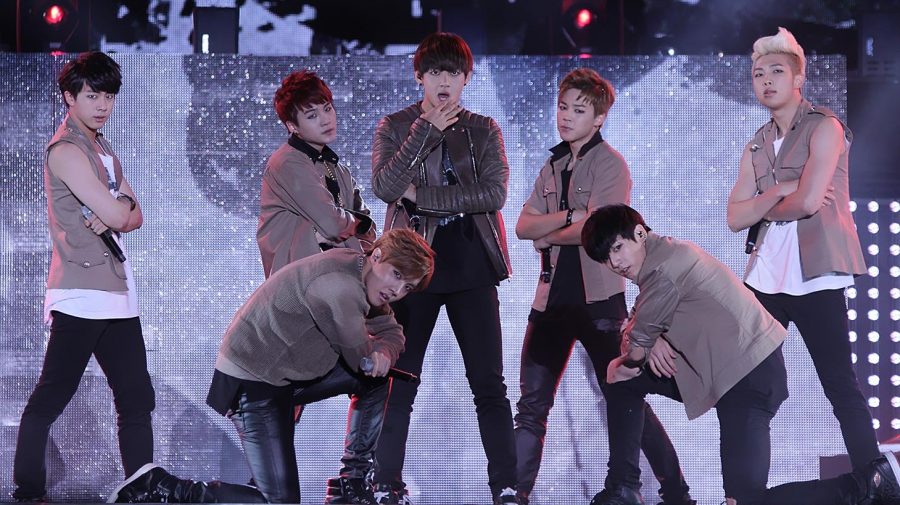The Dark Side of K-Pop Comes to Light
October 16, 2019
With its upbeat rhythms, synchronized dances, and positive lyrics, mainstream K-Pop has exploded beyond South Korea’s radio stations, reaching an international audience. From PSY’s track “Gangnam Style” in 2012—earning the title of the first video to reach a billion views on YouTube—to BTS’s rise to fame by breaking music records, Korean pop music has been gaining recognition worldwide. But beneath the glitz and glamour of these “idols” lies an underside of ugly truths that are too-often overlooked.
Public Image Pressure
Scandals and controversies have flooded the headlines of top news sources ranging from drug abuse to suicide, but the root of the problem lies in South Korea’s incredibly competitive society. In the capital of cosmetic surgery, the pressure to adhere to South Korean beauty standards takes a major toll on the well-being of idols.
In 2017, the four-member girl group Six Bomb spent $90,000 on “almost every kind of surgery that could be done on a face” for a single music video. “I wanted to see my image on the screen and not feel insecure,” explained Soa, the group’s petite 101-pound leader.
Drastic weight loss is not uncommon either. Jimin, the 134-pound vocalist and main dancer of BTS, has struggled to appeal to K-Pop’s beauty standards. He was called chubby and started to starve himself on extreme diets to the point of losing consciousness. In the TV show Please Take Care of My Refrigerator, he revealed, “I went on a diet where I survived off of one meal for 10 days.” IU, a thriving solo singer who has dominated the Korean pop music charts more than any other artist since 2010, also revealed on Koreaboo.com that “she went on a diet that consisted of an apple for breakfast, one sweet potato for lunch, and [a] protein shake for dinner”—all while stretching and exercising strenuously. The struggles Jimin and IU went through to maintain a certain weight and shape are representative of the pressure most K-Pop idols face.
This pressure does not come solely from the Korean public; management companies set rules for each trainee’s weight loss. According to Kathy Benjamin, a writer for Grunge, “being skinny is so important that no less than the CEOs of record companies supervise weigh-ins. If the number is too high, stars are told to lose weight immediately. And they do.” The idols who go on extreme diets still have to perform in their tired, sick, and weakened states. They train for at least six hours a day. Some, like BTS, train up to fifteen hours.
Slave Contracts
Companies have the rights to assign weight goals and hold monthly evaluations where performance skills are all graded and recorded due to “slave contracts.” Aspiring K-Pop idols as young as the age of twelve or thirteen first sign with an agency as “trainees” through a slave contract, allowing the company have almost full control over them. They are often restricted from dating, using social media, and driving. If the trainers feel that there hasn’t been enough “improvement,” the trainee will be kicked out of the agency.
As the agencies make millions off of the most successful trainees-turned-idols, their investment pays off; however, the trainees’ investments in K-Pop do not always turn a profit. Most trainees are still in school, juggling their academic life and trainee life; their daily schedules may begin as early as 5 a.m. and end as late as 1 a.m. Foreign students spend additional time mastering the Korean language and assimilating into Korean culture.
Scandals
In past years, agencies have taken advantage of “slave contracts” and stirred up multiple harassment incidents. In 2000, the manager of the artist Baek Ji-young secretly filmed her having sex, threatening to release the video when she tried to move to a different company.
And sexual exploitation is still prevalent in the K-Pop industry. YG Entertainment, one of the biggest entertainment labels in the country, has seen its star idols involved in several major scandals. Seungri from Big Bang, a five-member boy band that soon became known as the “kings of K-pop” after their debut, was arrested in March of 2019 for sex bribery and offering sex workers to his clients in his famous nightclub, The Burning Sun. This scandal made the front page of top news sources and first opened the public’s eyes to a different side of K-Pop. This “news” is new to the public, but not so new to those in the industry. Actress Jang Jayeon left a seven page suicide note in 2009, claiming that present-day sex slavery was widespread across Korean entertainment. Sexual exploitation, however, is not the only cause of suicide among artists.
The stars in the entertainment industry are no exception to the competitive, cutthroat culture of South Korea that places the country first among the highest suicide rates in developed countries. In 2017, the World Health Organization found that South Korea had 21 deaths by suicide per 100,000 individuals, compared to 13 deaths by suicide per 100,000 individuals in the United States. That same year, the positive, colorful facade of the K-Pop music industry collided with the shocking news that Kim Jonghyun—one of the nation’s most famous idols—had become another victim of South Korea’s suicide epidemic. The suicide of the 27-year-old lead singer from SHINee, one of the most popular boy groups in K-Pop history, flooded the headlines.
Even with all of the support Jonghyun garnered from fans and other idols while he was alive, his publicly-released note showed the struggles that were hidden behind his innocent smile: “The depression that gnawed on me slowly has finally engulfed me entirely,” he wrote, adding that he “couldn’t defeat it anymore.” What surprised his fans the most was that Jonghyun seemed perfectly happy in public appearances on the days leading up to his death.
Although Jonghyun’s death by suicide is arguably the most well-known in the K-Pop world, the plague of suicide permeates all levels of K-Pop artists; bogged down by the pressures of crafting their perfect public image and obeying “slave contracts,” several lesser-known K-Pop entertainers have also felt there was no way out except suicide.
As K-Pop increases in global popularity, so too does the significance of its scandals. When a scandal occurs, not only is the image of the artist tainted, but the image of K-Pop as a whole is affected as well. There is so much more to the dark side of K-Pop; for example, sasaengs, who are fans who are overly-obsessed with an idol or group. Jonghyun Lee from the band CNBLUE was practicing guitar in his dorm when he heard a giggling noise from behind his drawers where the sasaeng was hiding. The bubbly, youthful image of K-Pop is finally starting to be unmasked by more major news sources and is only starting to draw the public’s attention. Just as idols put their lives on the line to attain their dreams, it is our job to shine the light on the dark side of K-Pop and remind ourselves that they are human too.

















































































































































